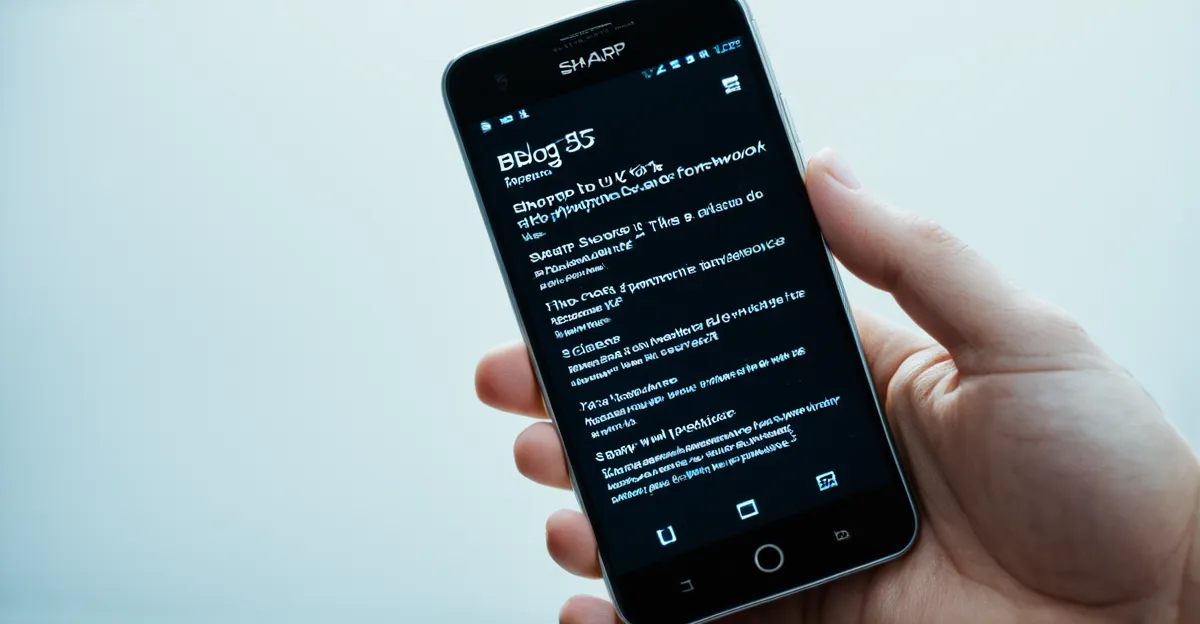Smartphones as Key Components in UK Computing Infrastructure
Smartphones have become integral to the UK computing infrastructure, shaping how digital services are accessed and delivered. Their proliferation is evident: smartphone adoption statistics UK reveal that over 90% of adults now own a smartphone, underscoring their role as primary computing devices. This widespread use makes smartphones pivotal in the ongoing digital transformation UK experiences.
These devices are no longer just communication tools; they function as gateways to cloud services, mobile banking, e-health, and remote work platforms. The integration of smartphones in UK computing enables real-time connectivity, data collection, and service delivery at unprecedented scales. This has accelerated the modernization of networks and infrastructure, favoring technologies that support mobile-first environments.
Also read : How Do Smartphones Transform the Landscape of UK Computing?
Moreover, usage statistics highlight increased reliance on smartphones for everyday tasks beyond calls, including digital payments and e-commerce, driving demand for robust infrastructure. The dynamic shift towards mobile interfaces compels infrastructure upgrades to maintain efficiency, security, and scalability. Therefore, smartphones are not merely endpoints but key drivers steering the evolution of digital landscapes within the UK computing infrastructure framework.
Influence of Smartphones on Mobile Networking and Data Usage
Understanding the impact of smartphone technology on data trends
Also to discover : How are smartphones influencing computing trends in the UK?
Smartphones have become pivotal in shaping mobile networking UK landscapes, largely driving the surge in mobile data consumption. With the widespread adoption of 5G smartphones UK users now experience faster, more reliable connections, which in turn fuels increased data traffic. According to recent data usage statistics, smartphones account for a significant majority of mobile data traffic, outpacing other connected devices.
This rise is not only due to increased device numbers but also enhanced capabilities like high-definition streaming, video calls, and cloud services. Telecom providers in the UK have responded by investing heavily in 4G and 5G infrastructure to meet the growing bandwidth demands. The collaboration between smartphone manufacturers and network operators ensures that network technologies and device capabilities evolve hand-in-hand, optimizing user experience.
For example, the integration of 5G smartphones UK market has led to more efficient use of spectrum and lower latency, enabling applications that were previously impractical. As a result, mobile networking UK continues to transform, propelled significantly by smartphone-driven mobile data consumption trends.
Smartphones and Cloud Computing Advancements
Smartphones have become the primary gateway to mobile cloud computing, facilitating seamless access to cloud services anytime and anywhere. This integration empowers both individuals and organisations to store, process, and retrieve data remotely, significantly enhancing productivity and flexibility. With the rapid growth of cloud adoption UK shows a clear trend towards embracing mobile-driven solutions in business, healthcare, education, and government sectors.
The evolution of smartphone-cloud integration allows users to leverage powerful cloud computing resources without the need for extensive onboard hardware. This shift supports data-heavy applications such as real-time collaboration, multimedia streaming, and advanced analytics directly on smartphones. For businesses, cloud adoption UK means scalable infrastructure with cost-effective maintenance and improved disaster recovery strategies.
Security remains a critical factor. Smartphones connected to clouds must ensure encrypted communications and robust authentication to protect sensitive information. Innovations in secure data storage and management within mobile cloud computing frameworks are addressing these concerns, fostering trust and compliance with data regulations. As a result, smartphone-cloud integration is pivotal for the future of connected, smart environments in both personal and professional contexts.
Transforming Business and Public Services with Smartphones
Small yet powerful driver of change
The mobile business UK sector has witnessed a radical shift with smartphones becoming pivotal to daily operations. Instead of relying solely on traditional desktops, many companies now integrate smartphone-driven innovation into their workflows. This allows for seamless communication, faster data access, and real-time decision-making, all accessible from the palm of a hand. For example, field teams use mobile apps to instantly update project statuses, facilitating enhanced productivity and agility.
On the public side, digital public services UK continue to expand with smartphone adoption. Government agencies now provide services like online applications, appointment bookings, and payment processing through mobile-friendly platforms. This convenience reduces wait times and improves citizen engagement, making government services more accessible regardless of location.
Notable UK firms and governmental bodies demonstrate that embracing smartphone technology optimizes operations and service delivery. These examples show that smartphone-driven innovation not only transforms internal business processes but also advances how public services meet people’s needs in a practical, efficient manner. The trend highlights a future where mobile solutions are central to both commercial success and public value creation.
Challenges and Opportunities for UK Computing Infrastructure
Smartphone reliance and its impact
The digital divide UK remains a pressing challenge as smartphones become central to everyday computing. Many individuals still lack reliable access to high-speed networks, which exacerbates inequality. This divide affects education, work, and access to essential services, making infrastructure improvements crucial.
Mobile security challenges also escalate with increased smartphone dependence. Threats like malware, unauthorized access, and data breaches target mobile users more frequently. Ensuring robust encryption and strong authentication protocols is vital for safeguarding privacy.
In response, infrastructure policy UK has evolved to address these issues through stronger regulatory frameworks. Government initiatives focus on expanding broadband coverage and enhancing cybersecurity standards, aiming to reduce disparities while protecting users.
Despite these challenges, smartphone integration presents opportunities for innovation and economic growth. Businesses can leverage mobile platforms to reach broader audiences and improve service delivery. As the UK adapts its infrastructure to support these devices, it can stimulate tech development and create new jobs in digital industries.
Balancing these challenges with proactive policies will be key to bridging the digital divide UK and securing a resilient, inclusive computing environment.





